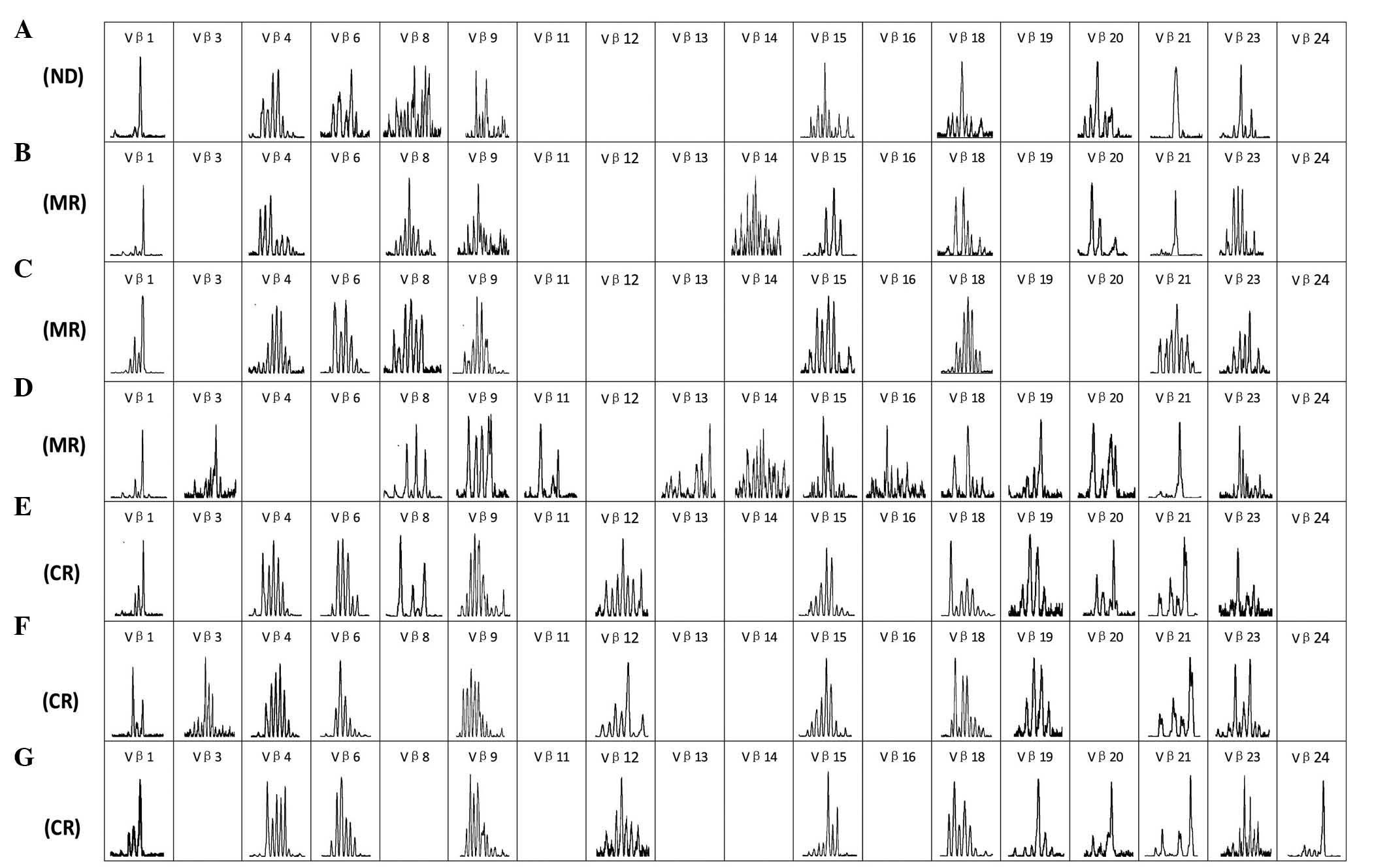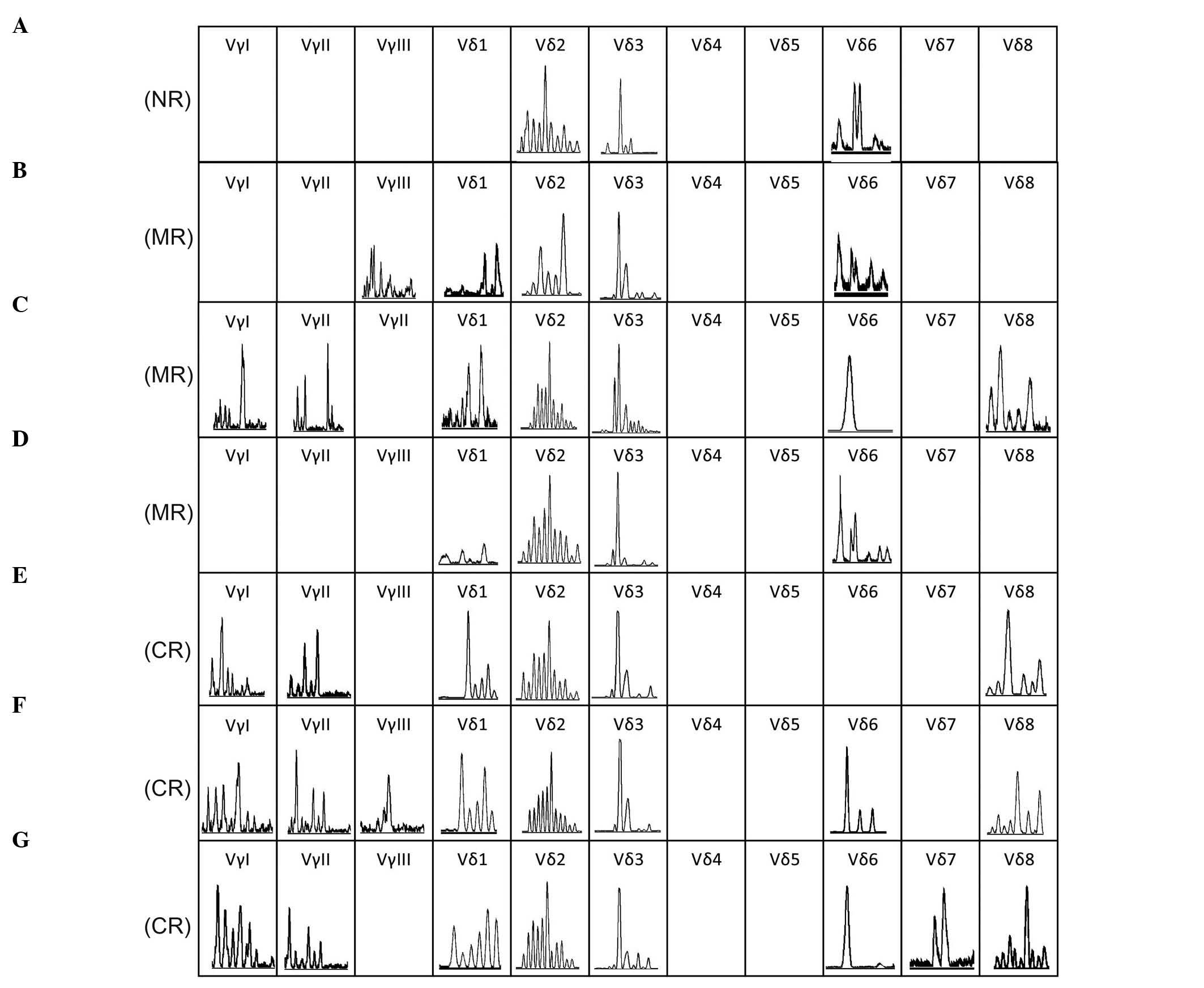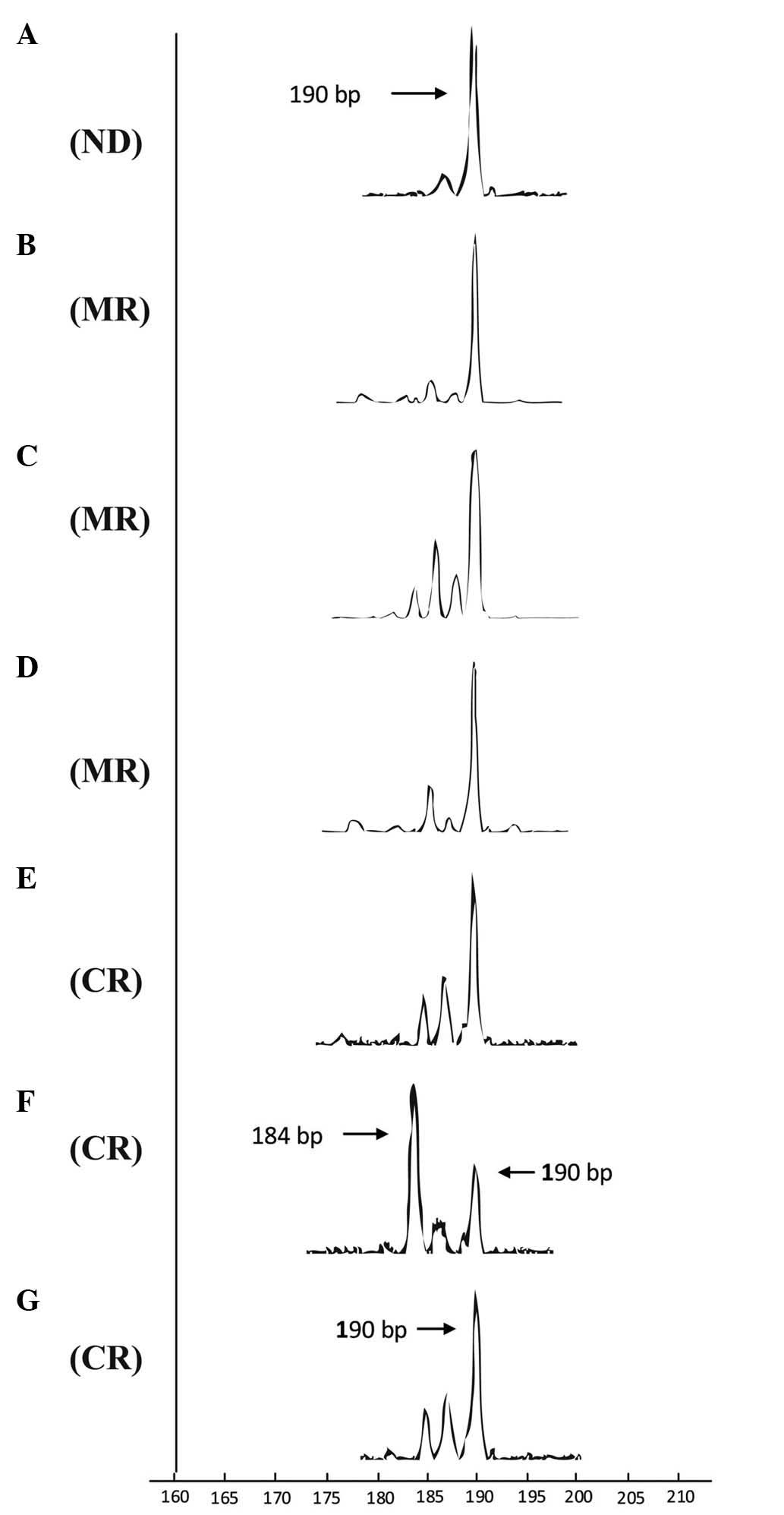|
1
|
Van Vlierberghe P and Ferrando A: The
molecular basis of T cell acute lymphoblastic leukemia. J Clin
Invest. 122:3398–3406. 2012. View
Article : Google Scholar : PubMed/NCBI
|
|
2
|
Bhojwani D and Pui CH: Relapsed childhood
acute lymphoblastic leukaemia. Lancet Oncol. 14:e205–e217. 2013.
View Article : Google Scholar : PubMed/NCBI
|
|
3
|
Van der Meulen J, Van Roy N, Van
Vlierberghe P and Speleman F: The epigenetic landscape of T-cell
acute lymphoblastic leukemia. Int J Biochem Cell Biol. 53:547–557.
2014. View Article : Google Scholar : PubMed/NCBI
|
|
4
|
Koyama D, Kikuchi J, Hiraoka N, Wada T,
Kurosawa H, Chiba S and Furukawa Y: Proteasome inhibitors exert
cytotoxicity and increase chemosensitivity via transcriptional
repression of Notch1 in T-cell acute lymphoblastic leukemia.
Leukemia. 28:1216–1226. 2014. View Article : Google Scholar : PubMed/NCBI
|
|
5
|
Litzow MR, Lee S, Bennett JM, Dewald GW,
Gallagher RE, Jain V, Paietta EM, Racevskis J, Rousey SR, Mazza JJ
and Tallman MS: A phase II trial of arsenic trioxide for relapsed
and refractory acute lymphoblastic leukemia. Haematologica.
91:1105–1108. 2006.PubMed/NCBI
|
|
6
|
Bornhauser BC, Bonapace L, Lindholm D,
Martinez R, Cario G, Schrappe M, Niggli FK, Schäfer BW and Bourquin
JP: Low-dose arsenic trioxide sensitizes glucocorticoid-resistant
acute lymphoblastic leukemia cells to dexamethasone via an
Akt-dependent pathway. Blood. 110:2084–2091. 2007. View Article : Google Scholar : PubMed/NCBI
|
|
7
|
Qian W, Liu J, Jin J, Ni W and Xu W:
Arsenic trioxide induces not only apoptosis but also autophagic
cell death in leukemia cell lines via up-regulation of Beclin-1.
Leuk Res. 31:329–339. 2007. View Article : Google Scholar : PubMed/NCBI
|
|
8
|
Hu XM, Hirano T and Oka K: Arsenic
trioxide induces apoptosis in cells of MOLT-4 and its
daunorubicin-resistant cell line via depletion of intracellular
glutathione, disruption of mitochondrial membrane potential and
activation of caspase-3. Cancer Chemother Pharmacol. 52:47–58.
2003. View Article : Google Scholar : PubMed/NCBI
|
|
9
|
Jiao Y, Zhang W, Liu J, Ni W, Xu W, Jin J
and Qian W: Telomere attrition and chromosome instability via
downregulation of TRF2 contributes to arsenic trioxide-induced
apoptosis of human T-Cell leukemia cell line molt-4 cells. Cancer
Biol Ther. 6:1186–1192. 2007. View Article : Google Scholar : PubMed/NCBI
|
|
10
|
Taghon T, Waegemans E and Van de Walle I:
Notch signaling during human T cell development. Curr Top Microbiol
Immunol. 360:75–97. 2012.PubMed/NCBI
|
|
11
|
Zheng H, Wang X, Ma Y, Xu B, Chen S, Yang
L, Wu X, Przybylski GK, Huang S, Ye T and Li Y: The TCR γδ
repertoire and relative gene expression characteristics of T-ALL
cases with biclonal malignant Vδ1 and Vδ2 T cells. DNA Cell Biol.
33:49–56. 2014. View Article : Google Scholar : PubMed/NCBI
|
|
12
|
Chen S, Huang X, Zheng H, Geng S, Wu X,
Yang L, Weng J, Du X and Li Y: The evolution of malignant and
reactive γδ+T cell clones in a relapse T-ALL case after allogeneic
stem cell transplantation. Mol Cancer. 12:732013. View Article : Google Scholar : PubMed/NCBI
|
|
13
|
Langerak AW, van Den Beemd R,
Wolvers-Tettero IL, Boor PP, van Lochem EG, Hooijkaas H and van
Dongen JJ: Molecular and flow cytometric analysis of the Vbeta
repertoire for clonality assessment in mature TCRalphabeta T-cell
proliferations. Blood. 98:165–173. 2001. View Article : Google Scholar : PubMed/NCBI
|
|
14
|
Prinz I, Thamm K, Port M, Weissinger EM,
Stadler M, Gabaev I, Jacobs R, Ganser A and Koenecke C: Donor Vδ1+
γδ T cells expand after allogeneic hematopoietic stem cell
transplantation and show reactivity against CMV-infected cells but
not against progressing B-CLL. Exp Hematol Oncol. 2:142013.
View Article : Google Scholar : PubMed/NCBI
|
|
15
|
Langerak AW, Szczepański T, van der Burg
M, Wolvers-Tettero IL and van Dongen JJ: Heteroduplex PCR analysis
of rearranged T cell receptor genes for clonality assessment in
suspect T cell proliferations. Leukemia. 11:2192–2199. 1997.
View Article : Google Scholar : PubMed/NCBI
|
|
16
|
Takeuchi J, Kyo T, Naito K, Sao H,
Takahashi M, Miyawaki S, Kuriyama K, Ohtake S, Yagasaki F, Murakami
H, et al: Induction therapy by frequent administration of
doxorubicin with four other drugs, followed by intensive
consolidation and maintenance therapy for adult acute lymphoblastic
leukemia: The JALSG-ALL93 study. Leukemia. 16:1259–1266. 2002.
View Article : Google Scholar : PubMed/NCBI
|
|
17
|
Kantarjian H, Thomas D, O'Brien S, Cortes
J, Giles F, Jeha S, Bueso-Ramos CE, Pierce S, Shan J, Koller C, et
al: Long-term follow-up results of hyperfractionated
cyclophosphamide, vincristine, doxorubicin and dexamethasone
(Hyper-CVAD), a dose-intensive regimen, in adult acute lymphocytic
leukemia. Cancer. 101:2788–2801. 2004. View Article : Google Scholar : PubMed/NCBI
|
|
18
|
Li Y, Chen S, Yang L, Yin Q, Geng S, Wu X,
Schmidt CA and Przybylski GK: TRAV and TRBV repertoire, clonality
and the proliferative history of umbilical cord blood T-cells.
Transpl Immunol. 18:151–158. 2007. View Article : Google Scholar : PubMed/NCBI
|
|
19
|
Li Y, Chen S, Yang L, Li B, Chan JY and
Cai D: TRGV and TRDV repertoire distribution and clonality of T
cells from umbilical cord blood. Transpl Immunol. 20:155–162. 2009.
View Article : Google Scholar : PubMed/NCBI
|
|
20
|
Assaf C, Hummel M, Dippel E, Goerdt S,
Müller HH, Anagnostopoulos I, Orfanos CE and Stein H: High
detection rate of T-cell receptor beta chain rearrangements in
T-cell lymphoproliferations by family specific polymerase chain
reaction in combination with the GeneScan technique and DNA
sequencing. Blood. 96:640–646. 2000.PubMed/NCBI
|
|
21
|
Gorski J, Yassai M, Zhu X, Kissela B,
Kissella B [corrected to Kissela B], Keever C and Flomenberg N:
Circulating T cell repertoire complexity in normal individuals and
bone marrow recipients analyzed by CDR3 size spectratyping.
Correlation with immune status. J Immunol. 152:5109–5119.
1994.PubMed/NCBI
|
|
22
|
Soignet SL, Frankel SR, Douer D, Tallman
MS, Kantarjian H, Calleja E, Stone RM, Kalaycio M, Scheinberg DA,
Steinherz P, et al: United States multicenter study of arsenic
trioxide in relapsed acute promyelocytic leukemia. J Clin Oncol.
19:3852–3860. 2001.PubMed/NCBI
|
|
23
|
Mahieux R and Hermine O: In vivo and in
vitro treatment of HTLV-1 and HTLV-2 infected cells with arsenic
trioxide and interferon-alpha. Leuk Lymphoma. 46:347–355. 2005.
View Article : Google Scholar : PubMed/NCBI
|
|
24
|
Schiller GJ, Slack J, Hainsworth JD, Mason
J, Saleh M, Rizzieri D, Douer D and List AF: Phase II multicenter
study of arsenic trioxide in patients with myelodysplastic
syndromes. J Clin Oncol. 24:2456–2464. 2006. View Article : Google Scholar : PubMed/NCBI
|
|
25
|
Vey N, Bosly A, Guerci A, Feremans W,
Dombret H, Dreyfus F, Bowen D, Burnett A, Dennis M, Ribrag V, et
al: Arsenic trioxide in patients with myelodysplastic syndromes: A
phase II multicenter study. J Clin Oncol. 24:2465–2471. 2006.
View Article : Google Scholar : PubMed/NCBI
|
|
26
|
Chen GQ, Zhu J, Shi XG, Ni JH, Zhong HJ,
Si GY, Jin XL, Tang W, Li XS, Xong SM, et al: In vitro studies on
cellular and molecular mechanisms of arsenic trioxide (As2O3) in
the treatment of acute promyelocytic leukemia: As2O3 induces NB4
cell apoptosis with downregulation of Bcl-2 expression and
modulation of PML-RAR alpha/PML proteins. Blood. 88:1052–1061.
1996.PubMed/NCBI
|
|
27
|
Galimberti S, Guerrini F, Salvi F, Petrini
I, Gioia D, Messa E, Palumbo GA, Cilloni D, Petrini M and Levis A:
Arsenic trioxide and ascorbic acid interfere with the BCL2 family
genes in patients with myelodysplastic syndromes: An ex-vivo study.
J Hematol Oncol. 5:532012. View Article : Google Scholar : PubMed/NCBI
|
|
28
|
Yedjou C, Tchounwou P, Jenkins J and
McMurray R: Basic mechanisms of arsenic trioxide (ATO)-induced
apoptosis in human leukemia (HL-60) cells. J Hematol Oncol.
3:282010. View Article : Google Scholar : PubMed/NCBI
|
|
29
|
Rojewski MT, Körper S and Schrezenmeier H:
Arsenic trioxide therapy in acute promyelocytic leukemia and
beyond: From bench to bedside. Leuk Lymphoma. 45:2387–2401. 2004.
View Article : Google Scholar : PubMed/NCBI
|
|
30
|
Mathas S, Lietz A, Janz M, Hinz M, Jundt
F, Scheidereit C, Bommert K and Dorken B: Inhibition of NF-kappaB
essentially contributes to arsenic-induced apoptosis. Blood.
102:1028–1034. 2003. View Article : Google Scholar : PubMed/NCBI
|
|
31
|
Kumar S, Yedjou CG and Tchounwou PB:
Arsenic trioxide induces oxidative stress, DNA damage and
mitochondrial pathway of apoptosis in human leukemia (HL-60) cells.
J Exp Clin Cancer Res. 33:422014. View Article : Google Scholar : PubMed/NCBI
|
|
32
|
Lu M, Levin J, Sulpice E, Sequeira-Le
Grand A, Alemany M, Caen JP and Han ZC: Effect of arsenic trioxide
on viability, proliferation, and apoptosis in human megakaryocytic
leukemia cell lines. Exp Hematol. 27:845–852. 1999. View Article : Google Scholar : PubMed/NCBI
|
|
33
|
Rousselot P, Labaume S, Marolleau JP,
Larghero J, Noguera MH, Brouet JC and Fermand JP: Arsenic trioxide
and melarsoprol induce apoptosis in plasma cell lines and in plasma
cells from myeloma patients. Cancer Res. 59:1041–1048.
1999.PubMed/NCBI
|
|
34
|
Akao Y, Mizoguchi H, Kojima S, Naoe T,
Ohishi N and Yagi K: Arsenic induces apoptosis in B-cell leukaemic
cell lines in vitro: Activation of caspases and down-regulation of
Bcl-2 protein. Br J Haematol. 102:1055–1060. 1998. View Article : Google Scholar : PubMed/NCBI
|
|
35
|
Li H, Zhu X, Zhang Y, Xiang J and Chen H:
Arsenic trioxide exerts synergistic effects with cisplatin on
non-small cell lung cancer cells via apoptosis induction. J Exp
Clin Cancer Res. 28:1102009. View Article : Google Scholar : PubMed/NCBI
|
|
36
|
Chiu HW, Tseng YC, Hsu YH, Lin YF, Foo NP,
Guo HR and Wang YJ: Arsenic trioxide induces programmed cell death
through stimulation of ER stress and inhibition of the
ubiquitin-proteasome system in human sarcoma cells. Cancer Lett.
356:762–772. 2015. View Article : Google Scholar : PubMed/NCBI
|
|
37
|
Ishitsuka K, Hanada S, Suzuki S,
Utsunomiya A, Chyuman Y, Takeuchi S, Takeshita T, Shimotakahara S,
Uozumi K, Makino T and Arima T: Arsenic trioxide inhibits growth of
human T-cell leukaemia virus type I infected T-cell lines more
effectively than retinoic acids. Br J Haematol. 103:721–728. 1998.
View Article : Google Scholar : PubMed/NCBI
|
|
38
|
Bazarbachi A, El-Sabban ME, Nasr R,
Quignon F, Awaraji C, Kersual J, Dianoux L, Zermati Y, Haidar JH,
Hermine O and de Thé H: Arsenic trioxide and interferon-alpha
synergize to induce cell cycle arrest and apoptosis in human T-cell
lymphotropic virus type I-transformed cells. Blood. 93:278–283.
1999.PubMed/NCBI
|
|
39
|
El-Sabban ME, Nasr R, Dbaibo G, Hermine O,
Abboushi N, Quignon F, Ameisen JC, Bex F, de Thé H and Bazarbachi
A: Arsenic-interferon-alpha-triggered apoptosis in HTLV–I
transformed cells is associated with tax down-regulation and
reversal of NF-kappa B activation. Blood. 96:2849–2855.
2000.PubMed/NCBI
|
|
40
|
Ishitsuka K, Hanada S, Uozumi K,
Utsunomiya A and Arima T: Arsenic trioxide and the growth of human
T-cell leukemia virus type I infected T-cell lines. Leuk Lymphoma.
37:649–655. 2000. View Article : Google Scholar : PubMed/NCBI
|
|
41
|
Mahieux R, Pise-Masison C, Gessain A,
Brady JN, Olivier R, Perret E, Misteli T and Nicot C: Arsenic
trioxide induces apoptosis in human T-cell leukemia virus type 1-
and type 2-infected cells by a caspase-3-dependent mechanism
involving Bcl-2 cleavage. Blood. 98:3762–3769. 2001. View Article : Google Scholar : PubMed/NCBI
|
|
42
|
Nasr R, Rosenwald A, El-Sabban ME, Arnulf
B, Zalloua P, Lepelletier Y, Bex F, Hermine O, Staudt L, de Thé H
and Bazarbachi A: Arsenic/interferon specifically reverses 2
distinct gene networks critical for the survival of HTLV-1-infected
leukemic cells. Blood. 101:4576–4582. 2003. View Article : Google Scholar : PubMed/NCBI
|
|
43
|
Ishitsuka K, Suzumiya J, Aoki M, Ogata K,
Hara S and Tamura K: Therapeutic potential of arsenic trioxide with
or without interferon-alpha for relapsed/refractory adult T-cell
leukemia/lymphoma. Haematologica. 92:719–720. 2007. View Article : Google Scholar : PubMed/NCBI
|
|
44
|
Hermine O, Dombret H, Poupon J, Arnulf B,
Lefrère F, Rousselot P, Damaj G, Delarue R, Fermand JP, Brouet JC,
et al: Phase II trial of arsenic trioxide and alpha interferon in
patients with relapsed/refractory adult T-cell leukemia/lymphoma.
Hematol J. 5:130–134. 2004. View Article : Google Scholar : PubMed/NCBI
|
|
45
|
Kchour G, Rezaee R, Farid R, Ghantous A,
Rafatpanah H, Tarhini M, Kooshyar MM, El Hajj H, Berry F, Mortada
M, et al: The combination of arsenic, interferon-alpha and
zidovudine restores an ‘immunocompetent-like’ cytokine expression
profile in patients with adult T-cell leukemia lymphoma.
Retrovirology. 10:912013. View Article : Google Scholar : PubMed/NCBI
|
|
46
|
Li Y, Geng S, Du X, Chen S, Yang L, Wu X,
Li B, Schmidt CA and Przybylski GK: Restricted TRBV repertoire in
CD4+ and CD8+ T-cell subsets from CML patients. Hematology.
16:43–49. 2011. View Article : Google Scholar : PubMed/NCBI
|
|
47
|
Shi L, Chen S, Yang L and Li Y: The role
of PD-1 and PD-L1 in T-cell immune suppression in patients with
hematological malignancies. J Hematol Oncol. 6:742013. View Article : Google Scholar : PubMed/NCBI
|
|
48
|
Yawalkar N, Ferenczi K, Jones DA, Yamanaka
K, Suh KY, Sadat S and Kupper TS: Prof-ound loss of T-cell receptor
repertoire complexity in cutaneous T-cell lymphoma. Blood.
102:4059–4066. 2003. View Article : Google Scholar : PubMed/NCBI
|
|
49
|
Eyrich M, Wiegering V, Lim A, Schrauder A,
Winkler B and Schlegel PG: Immune function in children under
chemotherapy for standard risk acute lymphoblastic leukaemia-a
prospective study of 20 paediatric patients. Br J Haematol.
147:360–370. 2009. View Article : Google Scholar : PubMed/NCBI
|
|
50
|
Zha X, Chen S, Yang L, Li B, Chen Y, Yan X
and Li Y: Characterization of the CDR3 structure of the Vβ21 T cell
clone in patients with P210 (BCR-ABL)-positive chronic myeloid
leukemia and B-cell acute lymphoblastic leukemia. Hum Immunol.
72:798–804. 2011. View Article : Google Scholar : PubMed/NCBI
|


















